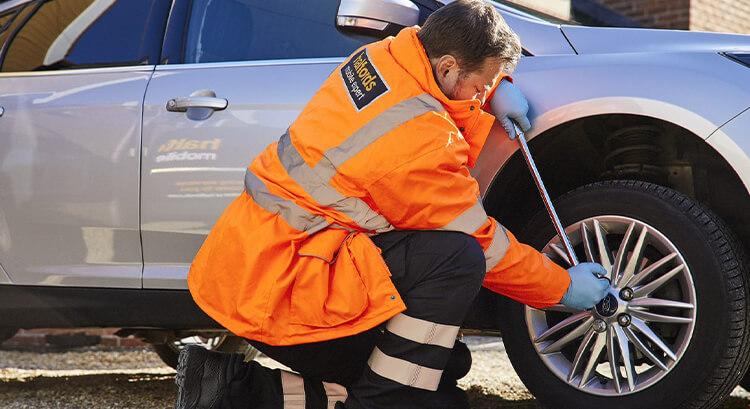Tyres help and advice
Get the answers to your tyre related queries right here with our handy tyres help and advice hub.
Whether you want to know how to change a tyre, how to check tyre pressure or what the marking on your tyre sidewall mean, you’ve come to the right place. We cover a range of tyre topics in our expert advice articles and how to guides to help you stay clued up on all things tyres!
Shop Tyres
Our tyre prices include fitting in the cost.
At Halfords, we offer same-day tyre fitting at dozens of our Autocentres nationwide, many of which are open seven days a week. So, whatever your reason for needing new tyres may be, we’ll get them fitted in no time.
We can also offer a range of mobile tyre fitting and vehicle services with Halfords Mobile Expert. We offer free mobile tyre fitting across all our appointments, simply choose a convenient slot online and we will meet you at home, the office or any other convenient location.
At Halfords, we offer 2 and 4 wheel alignment services. Most modern cars require 4 wheel alignment, particularly if your car is rear or four wheel drive. However, if you’re unsure, you should check with your chosen garage.
To book alongside your tyre fitting, look out for the pop up once you have confirmed your tyre slot, or visit our wheel alignment page.
Proceed through the booking steps and choose your new timeslot*
*By adding additional services to your basket, you will be required to choose a new timeslot to ensure our technicians have sufficient time to carry out your services together.
There are many aspects to consider when choosing the best tyres for your car, but here a few pointers:
- Fuel efficiency – the higher the grade, the lower the fuel consumption.
- Wet grip – the higher the grade, the shorter braking distances are in rainy weather.
- Noise – the fewer bars, the quieter the tyre. Only tyres with two bars or less will meet future legislation.
For further advice, please check out our guide on how to choose the best tyres for your vehicle.
Not necessarily, however some vehicle manufacturers recommend specific ‘OE homologated’ tyres which have been specifically designed for the vehicle and its unique characteristics.
It’s legal to use different branded tyres on your car, however, driving with different tyre tread patterns can alter the performance and safety of a vehicle, and in some instances can cause damage to other vehicle components
You should check your tyre pressure and tread every few weeks to ensure your tyres are sufficiently inflated and still safe to drive on.
Correct tyre pressure and tread is important for several key reasons:
- Illegal – driving with under inflated tyres/low tread depth is illegal and can result in costly fines.
- Safety - poor tyre pressure/tread depth can lead to the higher risk of over/understeering, increased braking distances and aquaplaning.
- Cost reduction - tyres with incorrect pressure will have a reduced life span and increase fuel consumption.
For more information, take a look at our guides on how to check and inflate car tyres and tread depth and safety.
You should check your tyre pressure and tread every few weeks to ensure your tyres are sufficiently inflated and still safe to drive on.
Correct tyre pressure and tread is important for several key reasons:
- Illegal – driving with under inflated tyres/low tread depth is illegal and can result in costly fines.
- Safety - poor tyre pressure/tread depth can lead to the higher risk of over/understeering, increased braking distances and aquaplaning.
- Cost reduction - tyres with incorrect pressure will have a reduced life span and increase fuel consumption.
For more information, take a look at our guides on how to check and inflate car tyres and tread depth and safety.
Correct tyre pressure is essential for safety and optimum performance when driving. Tyres are the only parts of your vehicle in contact with the road, and the pressurised air inside them carries the entire weight of the vehicle.
See the full FAQ answer here.
While the actual tyre pressure is not checked as part of an MOT test, a faulty Tyre Pressure Monitoring System (TPMS) will result in an MOT failure.
See the full FAQ answer here.
Yes, the pressure of your tyres can make a difference to your fuel consumption. Keeping your tyres at the recommended pressure is one of the most effective ways to reduce everyday fuel expenditure.
See the full FAQ answer here.
Tyre pressure sensors are part of the tyre pressure monitoring systems (TPMS), which check the pressure of your tyres and alert you if your tyres fall below the recommended level.
See the full FAQ answer here.
Run flats are designed to support cars in the event of a puncture, so you can continue driving safely to your home or nearest garage to have the tyre replaced. Run flat tyres have a reinforced outer shell which enables the tyre to maintain the rubber shape even without air. This allows you to keep driving for around 50 miles.
See the full FAQ answer here.
